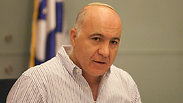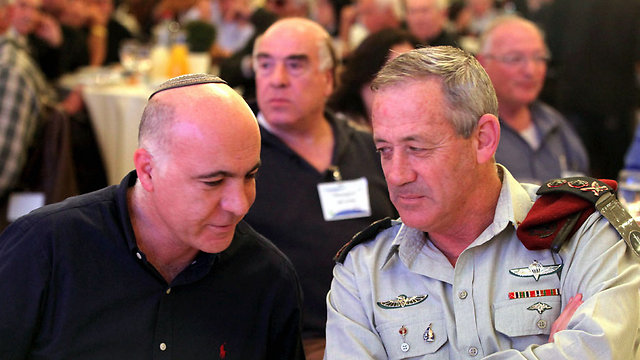
Shin Bet chief Yoram Cohen. 'Organization's officials acted amateurishly and carelessly'
צילום: אוהד צויגנברג
In search of fame, Shin Bet got caught in a blunder
Analysis: After enviously watching media worship IDF during and after Operation Protective Edge, General Security Service officials decided to boost their morale by going on investigative television program. It ended in humiliation.
At times when the Knesset filled up with former Shin Bet officials, smug and foolish, Knesset Member Ahmad Tibi used to deliver the following witticism: "Shin Bet officials who come out pose a threat to Israel's security. The moment the Arabs realize who they're dealing with, they'll no longer be afraid."

Well, he was right. It was true at the time and it's unfortunately still true now.
During and after Operation Protective Edge, the Shin Bet enviously watched the media worship of the IDF. The country was filled with stories of heroism: The heroism of the commanders and the heroism of the fighters, the heroism of the fallen and the heroism of the wounded, the heroism of the families and the heroism of the intelligence. The Shin Bet was left in the shadow, and felt its weight.
An exposure, Shin Bet officials convinced themselves, would boost the organization's morale and widen its pool of recruits. We will finally have a flattering report too; historical justice will finally be done. The crown of fame will be placed on the right heads - ours.
They chose the best program, Channel 2's "Uvda," hosted by investigative journalist Ilana Dayan. The report aired Monday evening. The affair ended Wednesday in a humiliating meeting at the prime minister's office, and in a humiliating statement that Shin Bet chief Yoram Cohen was forced to issue. The fame has gone, but the blunder remains.

Shin Bet chief Yoram Cohen with IDF Chief of Staff Benny Gantz. 'Senior Shin Bet officials, who boast that they can fool every Hamas man in Gaza, fell asleep in front of the camera' (Photo: Amit Shabi) (צילום: עמית שאבי)
I will not discuss what exactly happened during the program's preparation process. It's enough to say that the senior Shin Bet officials acted amateurishly and carelessly, with several key moments of mindlessness and lack of credibility.
These guys, who boast that they can fool every Hamas man in Gaza, fell asleep in front of the camera. They are now blaming the television editing, the narration, the drama, and describing miracles and wonders about the things that were said but were not aired. The poor guys had no idea what they were getting themselves into. And may God have mercy on them.
The Shin Bet adopted its motto from a verse in the Book of Judges: "The unseen shield." This embarrassing affair can be summed up with an opposite motto: "Seen with no shield." I'm not the only one saying this. Senior IDF officials are saying it. Shin Bet officials are saying it.
This issue is much more significant than a newspaper article. The head of the Military Intelligence Directorate during Operation Protective Edge, Major-General Aviv Kochavi, disagreed with Shin Bet chief Yoram Cohen about the reasons for the military conflict in Gaza. The Military Intelligence Directorate said Hamas wasn't interested in a clash, but rolled into it. That was also the Shin Bet's estimate until the end of 2013.
The Shin Bet began changing its estimate in January, intiially sotto voce, but stepped up gradually over the next few months. In April, both the IDF and Shin Bet agreed that there was a risk of a "strategic" attack in July, through the tunnels. The army began preparing, mainly in the southern Gaza vicinity. That's where the warnings pointed to.
Back to January. That month the Shin Bet distributed, as part of its regular information, a quote taken from a junior Hamas man, who said that Hamas should prepare for an initiated offensive in July. The Shin Bet expressed its reservations over the importance and credibility of the source.
A Shin Bet source told me this week, and reiterated, that the signs for a change in Hamas' stance were "weak," that the Shin Bet did not give them much consideration, and most importantly, that there was no warning from the Shin Bet of a war, a battle, a major flare-up. So why did the program claim that there was a warning? It was a misunderstanding.
That's important, because the term "warning" is part of our DNA, part of the national trauma. When we hear about a warning of war, we think about the Yom Kippur failure. We immediately imagine a Military Intelligence chief like Eli Zeira, preventing information about an imminent war, and the tunnels like the Egyptian military's operation to cross the Suez Canal, with almost 3,000 fighters who were killed in that war.
But there was no warning, no information was blocked, no canal was crossed and there was no war, only a restricted operation along the borderline. The tunnels were a troubling problem, which was mishandled and in some cases led to the killing of soldiers, but there is a big difference between that and the Yom Kippur War.










